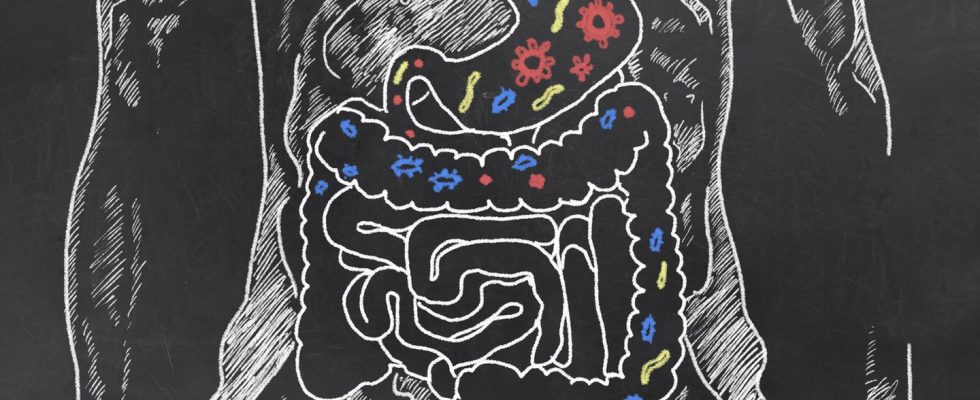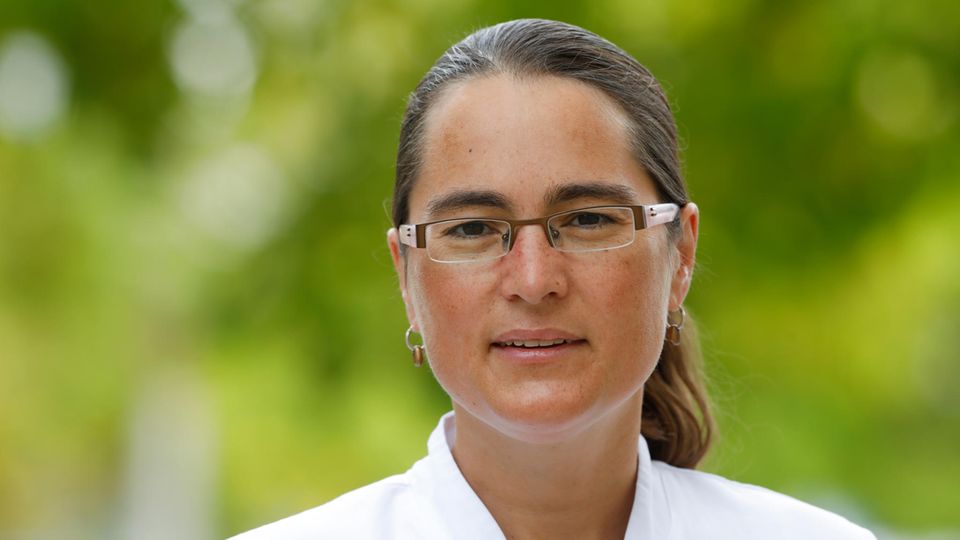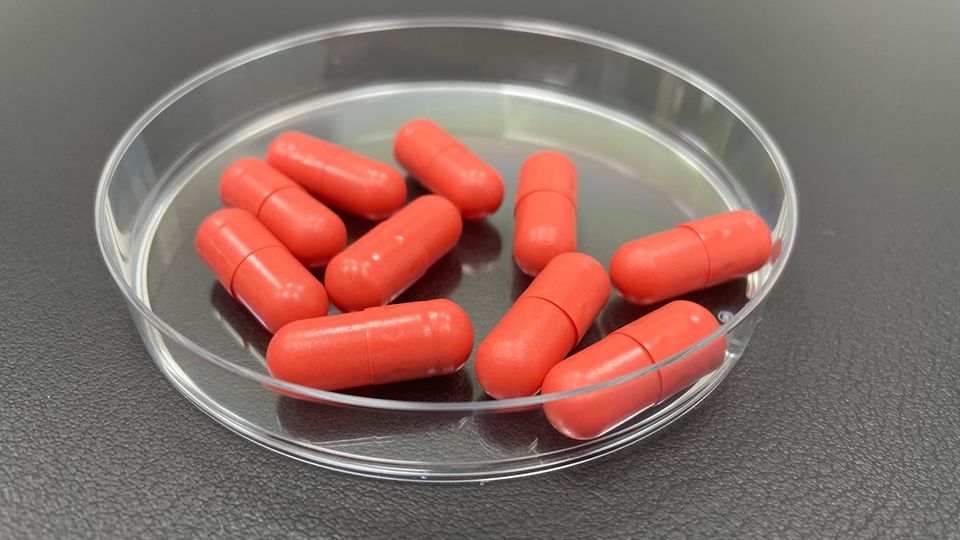People carry two kilograms of microbes in their intestines. For some, their mix is particularly healthy. If you transplant these chronically ill people, they can recover. There have been spectacular therapeutic successes in cancer medicine recently
The stool samples from particularly healthy donors are stored in a freezer at the University Hospital of Cologne at minus 80 degrees. When they are thawed, trillions upon trillions of microbes that have colonized the intestines of their donors come back to life. If these samples are transplanted in the form of capsules to people who suffer from chronic intestinal infections and inflammations, but also autoimmune diseases or cancer, this could mean a decisive step towards healing. The bacteria, fungi and viruses that live in each of us form a complex ecosystem – and exactly how this ecosystem is composed determines health and illness.
The microbe collection was built by infectiologist Maria Vehreschild, who now teaches and researches at the Frankfurt University Hospital. In conversation with the star she tries to dampen exaggerated hopes. And yet you quickly notice how passionate she is about her field of research and what great opportunities she sees on the horizon for chronically ill people.
Ms. Vehreschild, a company recently sent me an unsolicited self-test to analyze my intestinal flora. The test is intended to identify my “individual weak points” and, depending on the results, I will then receive individual nutritional recommendations. What’s that about it?
I view such tests as part of clinical care very critically. Of course, we analyze the microbiome of as many test subjects as possible for scientific purposes, but I see no indications for daily medical practice. In my opinion, neither sensible recommendations nor therapies can be derived from the test results; we don’t know enough about that yet. It is a principle of medicine that you should not do tests if they do not produce any usable results. Because that usually only leads to uncertainty. And then things are often decided that are not good for the patients.
On the website I found an offer for a probiotic that I could then take to become fitter and healthier.
There are prebiotics and probiotics, just to be clear. Prebiotics are the food that bacteria eat, and by consuming them you promote the growth of certain bacteria – that’s the idea, which basically makes sense. Probiotics, on the other hand, are the bacteria themselves that are said to have a health-promoting effect. However, there are very few studies that prove that such pre- or probiotics really have a health-promoting effect. Almost all of them fall under the category of dietary supplements. And in order to bring a dietary supplement onto the market, you only need to provide a small amount of study data.
And yet some probiotics are even recommended in medical guidelines. There must be a reason for that…
That’s true, but there are very few probiotics that have actually gone through studies and drug approval processes. They are used in certain cases for chronic inflammatory bowel diseases such as ulcerative colitis. A probiotic against infections with the problematic bacterium Clostridioides difficile is currently being tested in a larger study. These infections occur after taking antibiotics and lead to diarrheal diseases that are difficult to treat. I have more hopes for such developments than for probiotics that you can buy in the drugstore.
Another way to introduce healthy microbes into the gut is through fecal transplants like the ones you do. Who are they suitable for?
So far, especially in patients with Clostridioides difficile infections. And only when these infections return, i.e. after the second recurrence. This is the globally recognized indication and strongly recommended in guidelines. In Germany, however, we are only allowed to carry it out as a therapeutic attempt, which means that we produce a medication individually for a patient for whom other therapy options have failed and are fully responsible for the entire process. This makes the process very complicated…
Wait, I don’t understand that. An attempt at healing? As I understand it, that would mean that it is a therapy with questionable success, for example because there are hardly any studies. But if the treatment is even recommended in the guidelines, the study situation must be quite good.
It is, but that’s how it’s regulated in Germany. After all, it is still not an approved drug. That’s why I can only offer it as an attempt at healing. This is a somewhat bizarre situation. In other countries, stool transplant products are not subject to drug law but are considered transplants. Such a new legal regulation would make things easier for us.
Do you also try to cure other serious illnesses?
Yes, in rare and very select cases. But I would prefer not to be more specific, otherwise 200 patients would call here tomorrow and we wouldn’t be able to handle that.
These capsules, manufactured at the University Hospital of Cologne, contain microbial communities from the intestines of healthy donors that can help cure chronic diseases. For one therapy cycle, patients usually take 30 capsules in one day
© Anastasia Tsakmaklis
Two studies on patients with advanced black skin cancer from Israel recently caused a stir…
These are still very small studies. These were patients for whom certain immunotherapies, so-called checkpoint inhibitors, were not effective. The studies were based on the assumption that patients who respond to this therapy have a different microbiome constellation than those who do not. To then say: Okay, these bacteria here are crucial for the response.
The Israeli research teams then simply carried out stool transplants with donors who themselves suffered from melanoma and responded to the therapy..
Exactly. And it was a huge success. After fecal transplantation, the checkpoint inhibitors were effective in a proportion of patients, in three out of ten in the first study and in six out of fifteen in the second study. That doesn’t sound like much at first, but you have to imagine that without this intervention, all patients in these studies would most likely have died.
Can such spectacular success also be expected for other types of cancer?
I would be very careful. The idea is not that the transplanted bacteria have a direct effect on the tumor, but rather that they redirect the immune system. The immune system then fights the cancer that it previously did not recognize as an enemy. Without us understanding exactly how it works. This has now been shown for checkpoint inhibitors, but not yet for other cancer therapies.
Do people with autoimmune diseases also benefit from fecal transplants? I found scientifically published case reports that fecal transplantation was also effective in rheumatic diseases or multiple sclerosis…
But yes! We are currently looking for clinicians who would like to launch such a study with us. However, we have already carried out healing experiments on patients after stem cell transplantation – with the aim of preventing the transplanted immune system from attacking the recipient’s organs. Here, as with autoimmune diseases, the aim was to slow down an excessive immune system. And we’ve had success in cases where we’ve done this very early, when the rejection reaction had just begun.
How do you actually find healthy donors for your stool sample bank in Cologne?
It is very complex. First, the volunteers have to fill out questionnaires in which we ask about illnesses or risky behavior, for example drug use. We then take blood from those who are eligible and examine their stool for disease-causing bacteria. A real risk with a stool transplant is that potentially dangerous microorganisms are transferred to the recipient, who then becomes ill. We definitely want to avoid that.
And if the donors get through, will they be accepted once and for all?
No, we have to keep rescreening them. If, for example, you have taken antibiotics or caught a multi-resistant pathogen on a long-distance trip, you are no longer eligible as a donor. And of course they are examined again when they actually donate stool for a specific patient.
A conceivable alternative to stool donation by strangers would be your own stool transplant. So analogous to donating your own blood, which is possible if you undergo an operation in which you will predictably lose a lot of blood.
This is a promising approach. This would be conceivable, for example, before therapies in which the patient’s immune system is so severely suppressed by medication that they have to take antibiotics for a long period of time. I think a lot about the chair transplant. Actually, you should simply tell everyone, if they are 18 years old and still very healthy: Have your own stool preparation made by a competent institution, which will then be stored. But this is not possible for regulatory reasons. Because legally they are medications. So I would make a medicine for a healthy person. There are no good legal regulations for this, nor for the situations in which I can later administer it.
Word is spreading online about the potential healing power of the microbiome. Do-it-yourself instructions are circulating. I even know a young man with inflammatory bowel disease who tried this with a friend’s stool. What to make of this?
This is strongly discouraged. I like to compare fecal transplantation to blood transfusion. Nobody would think of preparing and implementing this themselves at home because everyone knows that it can be dangerous. In the same way, very high safety and quality standards apply when manufacturing such a chair product, which we have already talked about. Nobody can keep this at home.
Finally, let’s take a look into the future. What do you want to achieve in your research area in the coming years?
I would be very happy if more scientists than before would work with our preparations. I can imagine many indications for which exciting studies could be set up with our products. I see great potential for the therapeutic use of stool transplants, especially in cancer medicine. And we could produce significantly more.



